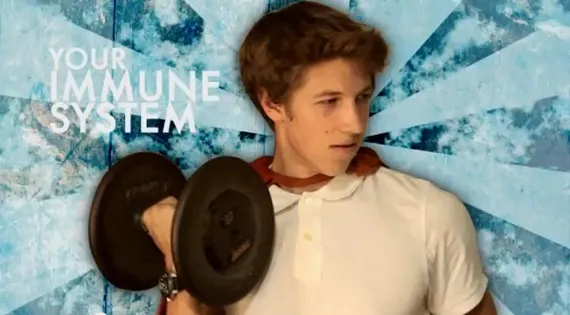Cariad Chester '13 Puts Interest in Virology and Video to Good Use

Cariad Chester '13 produced an educational video on the benefits of vaccines.
When Cariad Chester '13 heard Paul Offit speak on campus about the history and influence of the vaccine movement in the U.S., he was inspired, motivated, and mobilized. Soon after the talk, he contacted Offit, director of the Vaccine Education Center (VEC) at the Children's Hospital of Philadelphia, and proposed an idea for an internship: Chester, a neuroscience and religion major from Alfred, N.Y., would study virology and vaccinology at the Center and help produce materials advocating wider immunization among college students. Offit agreed.
Last June, Chester, who is also a Career Peer Advisor in Career Services, started his internship as part of his Summer Social Action Award (S2A2) project. The S2A2, as it's known, is funded through the Lang Center for Civic and Social Responsibility and is designed to enable students to engage in meaningful work with nonprofit organizations, grassroots advocacy groups, and public service agencies.
College students are at increased risk of contracting HPV, influenza, and meningococcal diseases, so that is where Chester focused his research - particularly meningococcal disease because of its obscurity and the increasing outbreaks of meningitis on college campuses throughout the U.S. With the support of the VEC, Chester worked with Fernando Maldonado '13, an English literature and film and media studies major from Hamilton Square, N.J., to produce a video that addresses common questions and intertwines Chester's research with engaging narrative. Together, they brought Reading, Pa., native Morgan Williams '13, a political science and psychology major and a member of Vertigo-go, Swarthmore's improv comedy group, on board to co-star and assist with production.
Ultimately, more than 20 students participated as actors in the video, which also features Worth Health Center Director Beth Kotarski.
"The greatest challenge was constructing an engaging narrative centered on the importance of getting the meningococcal vaccine," Chester says. "The anti-vaccine movement in the U.S. has too often used fear to shape public opinion on vaccine issues. In crafting an argument for immunization, we consciously tried to use humor as an alternative to scare tactics. While more compelling than rational arguments, fear exploits people who don't take the time to study the data behind public health measures. We used humor because we think it is a more honest approach to communicating information. We also felt that humor would be a better way to reach our target audience - college students."
Ultimately, the internship at VEC and Chester's experiences with the S2A2 project left a lasting impression - not just through the video, which can now be used to educate college students about the importance and necessity of vaccinations, but in Chester's own future path.
"This internship's combination of academic and applied medicine," he says, "allowed me to weave my interest in public health operations into my scientific background."



